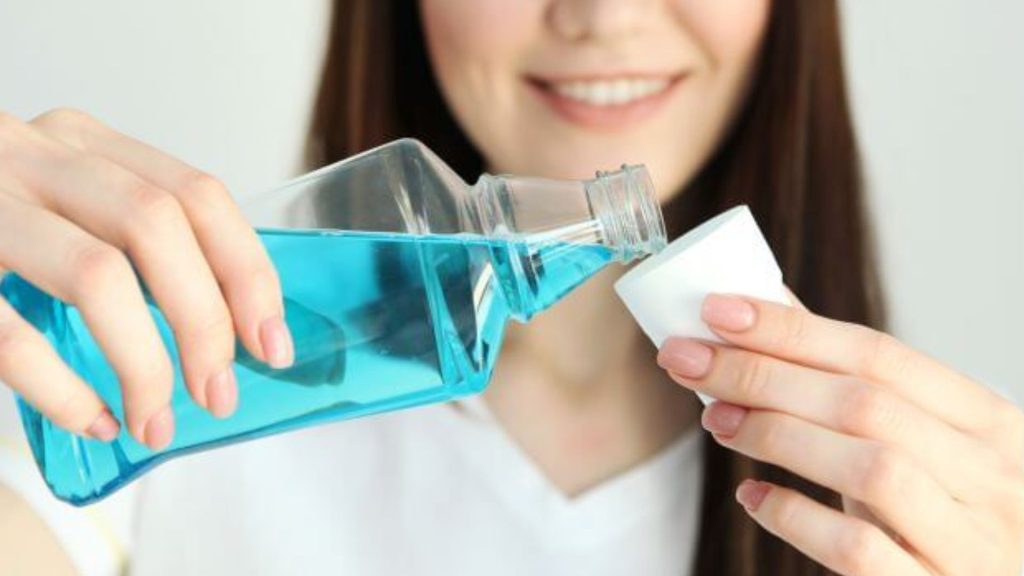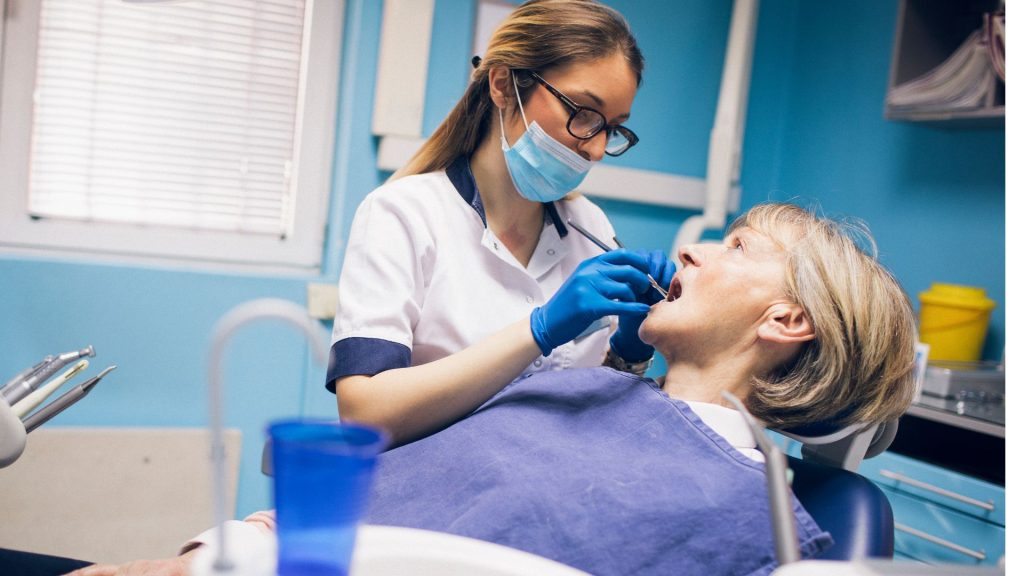What happens if you swallow mouthwash? Giving a little saliva is typically safe, but be cautious of the components. Hard water with alcohol might impair sleep. Others like fluoride and chlorhexidine might irritate the stomach. In large quantities, various harmful impacts may occur. Drug interactions and allergies may arise. Working with less water in clothes is normally safe, but see a doctor if required. Understanding the subtle effects of this everyday activity can help us care for our teeth. Let’s discuss the risks of swallowing mouthwash and how to maintain a healthy, confident smile.
Mouthwash Ingredients
Mouthwash is a tool for enhancing standard dental hygiene routines. Unlike brushes and floss, mouthwash can reach hard-to-reach parts of the mouth, helping to clean and preserve the health of teeth, gums, and breath. This article discusses mouthwash and its key constituents.
When you hold the mouthwash container in your hand, you are holding a complex solution meant to clean, protect, and enhance your dental health. Those refreshing drops include vital elements capable of combating germs, inflammation, and bacterial plaque. Let’s look at the “secret” behind mouthwash’s primary components and see how they contribute to fresh breath, brighter teeth, and a confident grin.
- Alcohol (Ethanol): To kill and prevent germs, mouthwash commonly contains it. Alcohol-based mouthwash may cause dry mouth in certain people.
- Antibacterial agents: To attack germs and prevent plaque, chlorhexidine, cetylpyridinium chloride, and thymol are employed.
- Anti-plaque: Bacterial plaque is reduced by zinc citrate, triclosan, and chlorhexidine.
- Fluoride: It is sometimes added to mouthwashes to fortify enamel and stop decay. It remineralizes teeth and shields them from acid.
- Anti-gingivitis agents: Anti-inflammatory and antibacterial substances minimize gingivitis and enhance gum health.
- Flavorings and Colorings: These additives give mouthwash its cool, minty taste and aroma.
- Water softeners and flavorings: These additives might improve the effectiveness and flavor of mouthwash.
Can You Swallow Mouthwash?
Under normal conditions, you should not consume mouthwash. Mouthwash is not intended to be consumed; rather, it is designed to eliminate food particles and bacteria from the mouth. So, see a doctor if you unintentionally swallow mouthwash or if you have any problems after eating mouthwash for specific advice and to ensure your health.
If You Swallow Mouthwash Can It Kill You?
Nobody is killed by mouthwash. All mouthwash products are meant to be used externally and should not be consumed. However, ingesting a tiny quantity of mouthwash while using this medication is safe. Avoid doing this regularly or in huge quantities. Large mouthwash quantities may include harmful alcohol and other chemicals. Regular and long-term alcohol interaction with the stomach lining may damage it and cause stomach ulcers.
Some mouthwashes feature dental care and antimicrobial chemicals. Depending on the product, swallowing significant quantities of these substances might induce digestive difficulties or allergies.
So, swallowing mouthwash once is safe, but doing it regularly and in huge amounts is not. The potentially fatal effects of ingesting mouthwash have been discussed. You know that, when used correctly, mouthwash poses no risk of fatality. Here’s what happens when you swallow mouthwash. We can learn more about the effects of mouthwash on the body and how to use it properly.
What Happens If You Swallow Mouthwash?

You wonder if is it bad to swallow mouthwash? There is normally no cause for alarm if you accidentally ingest some mouthwash. However, there are a number of issues that may arise from ingesting large amounts of mouthwash on a frequent basis. Some factors to think about are as follows:
Effects of Alcohol
- Potential for mouth ulcers: Certain mouthwashes include alcohol and antibiotic compounds. Swallowing large amounts of alcohol-containing mouthwash may result in mouth ulcers and discomfort. Furthermore, alcohol may cause pain by drying out the tongue and throat lining.
- Effects on the digestive system: Chemicals in mouthwash, especially alcohol, might irritate the gastrointestinal tract. If you consume a lot of alcohol-based mouthwash, your stomach may get irritated.
Chemical Compound Effects
- Allergy risk: An allergic reaction to one of the mouthwash ingredients may cause discomfort, facial or lip swelling, as well as breathing difficulties.
- Potential impact on gastrointestinal bacteria: Clohexidine in mouthwash prevents bacteria development. However, ingesting a lot of mouthwash with this chemical might harm gut microorganisms.
- Potential to change drug absorption.
Basically, it’s not a big deal if you accidentally swallow some mouthwash every once in a while. If you absolutely must swallow any mouthwash, use it as prescribed and drink just a little bit.
Accidentally Rinse Your Mouth? What Should You Do?

When we’re done brushing our teeth, it’s normal practice to rinse our mouths with mouthwash. This is uncommon and poses little danger, but it may be mitigated with careful handling. If you find yourself mistakenly using mouthwash, please refer to the following:
- Discontinue use immediately: If you accidentally swallow mouthwash, you should cease using it right away and seek medical attention.
- Spit mouthwash: If you still taste mouthwash after rinsing, discard it.
- Rinse mouth with clean water: Don’t forget to rinse your mouth thoroughly with plain water after using mouthwash so that no residual taste remains.
- Consider the ingredients: The ingredients in your mouthwash should be examined. Check labels if you have the opportunity to determine whether they include substances that may cause trouble swallowing.
Ultimately, these suggestions may help you safeguard your oral health, despite the fact that sometimes swallowing a small amount of mouthwash doesn’t represent a major danger.
Conclude

To sum up, if you want to achieve and maintain optimum oral health, you need to know the potential adverse effects of using mouthwash as part of your normal dental care regimen. Although mouthwash is safe to swallow sometimes, large or frequent dosages should be avoided to avoid unpleasant side effects. Good oral health and self-esteem need regular dental checkups. Spring Orchid Dental Clinic has highly trained professionals waiting to serve your dental needs. It helps in the detection and treatment of dental problems and also offers general advice on how to maintain good oral health.
So, making regular dental visits at Spring Orchid Dental Clinic is good for your health and smile. Go to Spring Orchid Dental Clinic if you want to take good care of your teeth.
FAQs
What Should We Do If Kids Swallow Mouthwash?
It’s cause for worry and maybe intervention if kids develop a habit of drinking mouthwash. Children shouldn’t be encouraged to gulp down mouthwash because of the possible risks to their health. Here are some ideas to assist your kid break the habit:
- Explain the effects: Clearly demonstrate the after-effects of drinking mouthwash to your youngster. Make it very clear that certain people may be harmed if they ingest the ingredients included in mouthwash.
- Good role model: Make sure to model good oral hygiene habits for your kids by regularly washing your mouth in their presence.
- Instructions for proper mouthwashing: Help kids learn how to properly clean their mouths by telling them not to swallow mouthwash. They should spray mouthwash into their lips, swish it around for a short time, and then spit it out as advised.
- Choose the right product: You should choose a mouthwash that has no alcohol or possibly dangerous chemicals. Milder, safer products may be appropriate for youngsters.
Talk to your child’s doctor or a healthcare expert for individualized guidance if he or she continues to swallow mouthwash after being warned not to.
How Much Mouthwash Is Dangerous To Swallow?
No amount of mouthwash is “dangerous” when consumed, although a little bit shouldn’t be a problem.
However, excessive or regular mouthwash use may cause the problems we mentioned previously. To avoid ingesting harmful germs, mouthwashes are meant to be swished about the mouth rather than ingested whole. The potential side effects and dangers of ingesting mouthwash depend on factors such as the product’s contents and the individual using it.
How Long Do You Keep Mouthwash In Your Mouth?
The recommended mouthwash time and method of usage may fluctuate. However, you should only use mouthwash for 30 seconds to a minute. The mouthwash will have destroyed the germs by this time. Follow any supplementary product instructions to ensure appropriate use and avoid unexpected consequences. For optimal oral health, use mouthwash after brushing and before flossing.





